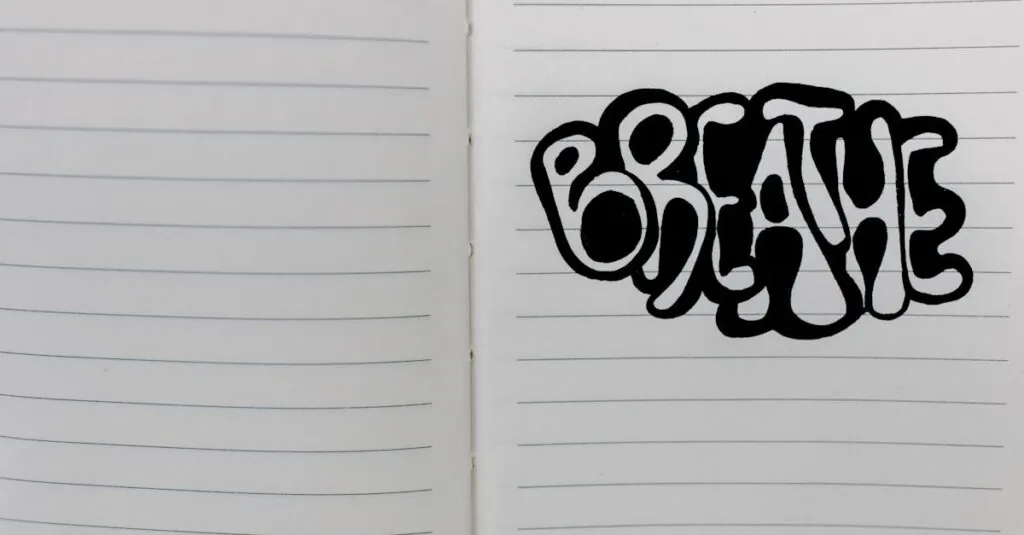In a world overflowing with stuff, the minimalist mindset shift is like a breath of fresh air—if that air didn’t come with a side of clutter. Imagine swapping chaos for clarity, where the only thing weighing you down is your cat’s judgmental stare. Minimalism isn’t just about tossing out half your belongings; it’s a transformative journey that invites simplicity into everyday life.
Embracing this mindset can lead to unexpected joys, like finding your kitchen counter again or actually remembering what you went to the store for. By prioritizing what truly matters, individuals can create space for experiences over possessions. So, if you’re ready to kick clutter to the curb and invite peace into your life, it’s time to dive into the minimalist mindset shift. Who knew less could feel like so much more?
Table of Contents
ToggleUnderstanding Minimalism Mindset Shift
Adopting a minimalist mindset transforms perspectives on life and priorities. This mindset shift invites individuals to rethink their relationship with material possessions and simplify their lives.
Definition of Minimalism
Minimalism embodies a lifestyle focused on simplicity and intentionality. It emphasizes valuing experiences over possessions. Individuals committed to minimalism often reduce physical clutter to create space for what truly matters, including relationships and personal growth. Living minimally means choosing to prioritize quality over quantity in all aspects of life. This approach fosters a sense of calm and clarity.
Importance of Mindset in Minimalism
Mindset serves as the foundation for embracing minimalism effectively. A strong mindset leads to more intentional decision-making regarding possessions and activities. Individuals with a minimalist mindset learn to resist societal pressures that equate success with accumulation. They discover fulfillment in the absence of excess, allowing them to appreciate the present moment. Cultivating this mindset encourages a deeper understanding of personal values, ultimately guiding lifestyle choices aligned with those values. Minimalism becomes not just a practice, but a way of living authentically.
Benefits of Adopting a Minimalism Mindset Shift
Adopting a minimalism mindset offers numerous benefits that contribute to a more intentional and fulfilling lifestyle. This approach simplifies daily decisions and fosters deeper connections to experiences and values.
Enhanced Focus and Productivity
Enhanced focus emerges as a key advantage of minimalism. By reducing distractions, individuals gain clarity on their goals and priorities. Intentional living allows for streamlined routines that eliminate unnecessary tasks. Fewer possessions correlate to a more organized workspace, which promotes efficiency and task completion. With a clear environment, creativity flourishes as individuals engage more fully with their work.
Improved Mental Well-Being
Improved mental well-being stems from embracing minimalism’s principles. A decluttered space directly impacts stress levels and anxiety. When individuals prioritize essential items over excess, they experience a sense of calm and clarity. This shift encourages mindfulness, fostering gratitude for what truly matters in life. Reduced mental clutter leads to heightened emotional resilience, making it easier to navigate challenges. Individuals often report increased happiness linked to meaningful experiences rather than material possessions.
Practical Steps to Achieve a Minimalism Mindset Shift
Embracing minimalism involves practical steps that align day-to-day living with essential values. These steps make the transition smoother and promote lasting change.
Decluttering Your Space
Decluttering begins with assessing belongings. Identify items that no longer serve a purpose or bring joy. Donate or recycle these items to create a sense of freedom and openness in your environment. Organizing what’s left into categories simplifies maintaining an orderly space. Create designated areas for essential items, reducing visual chaos and enhancing clarity. Regularly schedule decluttering sessions to cultivate ongoing awareness of your belongings. This practice fosters a strong connection to what’s truly important, reinforcing a minimalist approach.
Simplifying Your Life and Commitments
Simplifying life often requires a thorough evaluation of commitments. Analyze how each activity aligns with personal values and priorities. Decline engagements that do not contribute to well-being or personal growth. Setting boundaries on time commitments nurtures a more balanced lifestyle. Create a prioritized list of essential tasks, focusing energy on what matters most. This shift encourages a more intentional approach to decisions. Mindful decision-making leads to a life filled with meaningful experiences rather than unnecessary obligations.
Challenges in Transitioning to a Minimalism Mindset
Transitioning to a minimalism mindset presents several challenges. Individuals often face emotional attachments to their belongings, making it difficult to let go.
Overcoming Emotional Attachments
Overcoming these attachments requires self-reflection and mindfulness. Individuals may find it helpful to ask themselves whether items contribute to their happiness or serve a purpose. Letting go can lead to growth and liberation. Developing a clear vision of what is essential aids the process. Prioritizing experiences over objects fosters a sense of fulfillment. Writing down memories associated with items helps clarify what truly matters. Recognizing that memories reside within them—not in physical possessions—supports emotional detachment. Building connections with people and experiences encourages individuals to shift their focus away from material belongings.
Dealing with Societal Pressures
Dealing with societal pressures complicates the journey to minimalism. Expectations to accumulate wealth and possessions can create feelings of inadequacy. Surrounding oneself with minimalism advocates cultivates an environment supportive of simpler living. Understanding the difference between needs and desires helps in resisting external influences. Celebrating small victories in the decluttering process reinforces commitment to a minimalist mindset. Crafting a personal definition of success based on values rather than societal standards aids in maintaining focus. Sharing experiences and challenges with a supportive community fosters encouragement and accountability. Emphasizing an intentional lifestyle transforms how individuals perceive societal norms.
Adopting a minimalist mindset can be a transformative journey toward a more intentional life. By prioritizing experiences over possessions individuals can cultivate clarity and focus that enhances daily living. This shift not only reduces chaos but also invites peace and fulfillment into one’s life.
As they embrace minimalism they’ll discover the joy of meaningful connections and a deeper appreciation for what truly matters. The process of letting go and simplifying will empower individuals to align their choices with their core values fostering personal growth.
Ultimately a minimalist mindset isn’t just about decluttering physical space; it’s about creating a life rich in purpose and authenticity. With each step taken toward minimalism individuals can unlock a more satisfying and joyful existence.



